Emergency & Critical Care Technologist
Entry Level Qualification
12
Career Fields
Allied & Para Medical Science
For Specially Abled





Career Entrance Exam
NEET UG, NEET PG, NEET SS, JIPMER MSC/MPH, AIIMS MSC, AIIMS BSC, AIIMS PG INICET
About Career
PARTICULARS | DESCRIPTION |
Name | Emergency & Critical Care Technologist |
Purpose | Provide Crucial Emergency Medical Care |
Career Field | Allied & Para Medical Science |
Required Entrance Exam | NEET UG, NEET PG, NEET SS, JIPMER MSC/MPH, AIIMS MSC, AIIMS BSC, AIIMS PG INICET |
Average Salary | 150000 - 300000 Rs. Per Year |
Companies For You | Fortis, Kokilaben Dhirubhai Ambani Hospital Medical Research Institute, Apollo Hospital & Many More |
Who is Eligible | Class 12th Pass |
1. Emergency and Critical Care Technologists are healthcare professionals involved in the management of patients with life-threatening injuries and trauma or with complex medical and surgical illnesses that require emergency attention and treatment at hospitals. They work at Emergency and Trauma Care facilities of hospitals, Intensive Care Units (ICUs), Operation Theatres (OTs), or similar facilities. Emergency & Critical Care Technologists are also responsible for installing, maintaining, and operating hi-tech medical devices and various types of medical equipment for patient care.
2. As an Emergency & Critical Care Technologist, you would provide basic yet crucial emergency medical care to critically ill or injured patients who need on-the-spot diagnosis and treatment. The critically ill patients might have dysfunction of organs such as liver or kidney, might be suffering from cardiac failure, might have suffered strokes, or might have multiple injuries from an accident. You would be a part of the emergency care department and perform emergency medical procedures (basic life support/cardiac life support/ and similar) under the directed supervision of other healthcare professionals.
3. Now that you know about the machines and equipment that you would be engaged with, you must also know that this healthcare field involves many other professionals under whose guidance and support you would work but not entirely. As an Emergency and Critical Care Technologist, you would have a lot of technical knowledge and know-how of high-end machines and equipment, so your job would majorly be operating these high-tech machines in hospitals while the actual medical treatment would be performed by doctors and medical professionals. Understand that as soon as the patient is brought in, the primary treatment will be done by medical doctors and experienced professionals. In situations where a patient undergoes critical surgery or treatment, there would be several high-tech machines/devices for which you would be in charge.
4. Therefore as an Emergency & Critical Care Technologist, you would be responsible for providing technical assistance to surgical teams and doctors; preparing the facility (OT or ICU) for surgeries, and operating machines like ventilators and other life care devices that need constant tracking and efficient functioning. A job in this career is not only challenging but requires extra caution, knowledge, and training in a particular field.
Key Roles and Responsibilities
As an Emergency & Critical Care Technologist, you would be engaged in one or more of the following roles and responsibilities:
1. You would respond to emergency medical assistance in cases of accident/ trauma cardiac failure, etc.
2. You would assess a patient’s condition and keep track of necessary monitoring devices
3. You would provide first-aid treatment or life support care to sick or injured patients
4. You would be involved in transferring patients to the emergency department of a hospital or other healthcare facility
5. You would report their observations and treatment to physicians, nurses, or other healthcare facility staff
6. You would be involved in setting up equipment, connecting patients, and regularly monitoring the medical devices/equipment being used
7. You would carry out regular maintenance checks of intensive care equipment and bedside
8. You would also work with other healthcare professionals during life-threatening events.
9. You would be involved in advising and training medical staff on the use of equipment
Career Entry Pathway
Class 10 all subjects as per the scheme of studies – Class 11-12 Physics, Chemistry, and Biology along with any other subject as per the scheme of studies – B.Sc. in Accident & Emergency Care Technology/ Critical Care Technology – Work as Emergency & Critical Care Technologist.
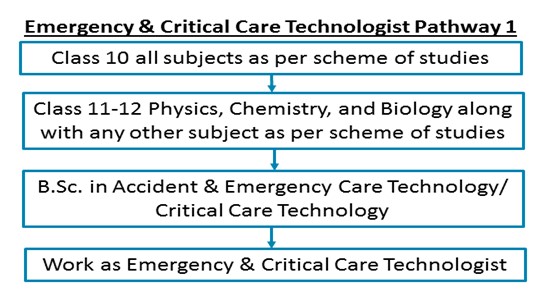
After completing Class 11-12 Physics, Chemistry, and Biology along with any other subject as per the scheme of studies you can go for a B.Sc. in Accident and Emergency Care Technology/ Critical Care Technology. After graduation, you can then start working as an Emergency & Critical Care Technologist.
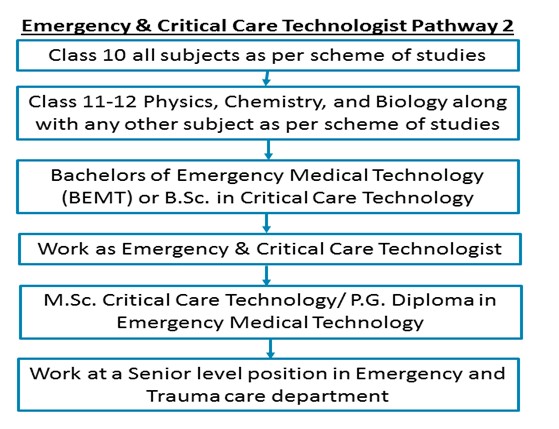
After completing Class 11-12 Physics, Chemistry, and Biology along with any other subject as per the scheme of studies you can go for a degree in Bachelor of Emergency Medical Technology (BEMT) or B.Sc. in Critical Care Technology. After completing graduation you can then start working as an Emergency & Critical Care Technologist. In case you wish to study further, after completing your bachelor's you can then go for M.Sc. Critical Care Technology/ P.G. Diploma in Emergency Medical Technology. After acquiring a master’s degree you can then start working in a senior-level position in the Emergency and Trauma care department.
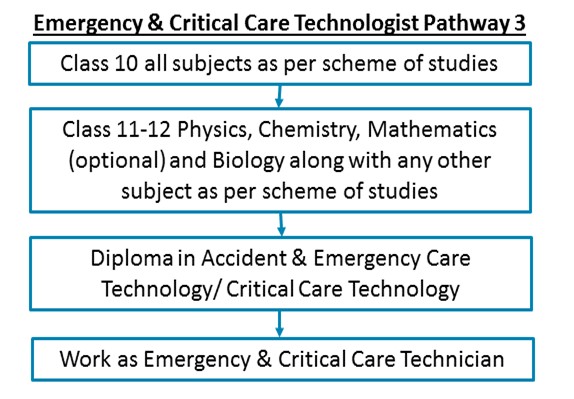
After completing Class 11-12 Physics, Chemistry, and Biology along with any other subject as per the scheme of studies, you can pursue a Diploma in Accident and Emergency Care Technology/ Critical Care Technology. After completing the diploma you can directly start working as an Emergency & Critical Care Technician.
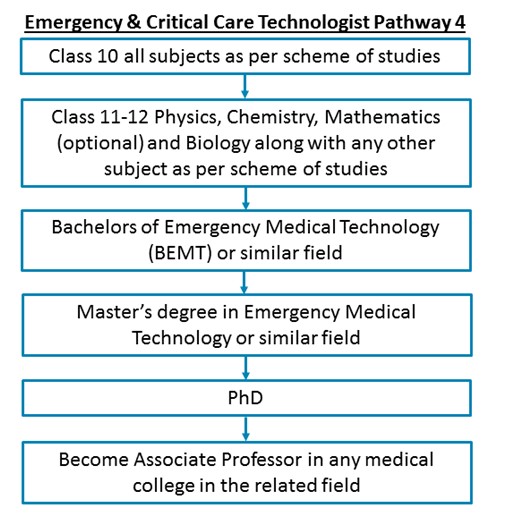
This career entry pathway is for those students to wish to work in an academic field. After completing Class 11-12 Physics, Chemistry, Mathematics (optional), and Biology along with any other subject as per the scheme of studies you can go for a Bachelor of Emergency Medical Technology (BEMT) or a similar field followed by a master's. After completing a master's you can then opt for a PhD and then become an Associate Professor in any medical college in the related field.
Required Qualification & Competencies
After completing higher secondary education you can go for a B.Sc. in Accident & Emergency Care Technology/ Critical Care Technology and start working as an Emergency & Critical Care Technologist. Although not many students pursue further studies after graduation as they start working as technologists in hospitals and healthcare centers in case you wish to study further you can go for a master’s degree in Emergency Medical Technology or a similar field.
MINIMUM EDUCATION REQUIRED | MAXIMUM EDUCATION REQUIRED |
Under Graduate Undergraduate Degree / Honours Diploma / Graduate Diploma (equivalent to a Degree) Programs for which the minimum eligibility is a pass in Higher Secondary / Class XII School Leaving examination. | Post Graduate Postgraduate Degree / Diploma / Certificate Programs for which the minimum eligibility is a pass in Graduation / equivalent Diploma program like Honours Diploma or Graduate Diploma. |

Competencies Required
Interest
1. Enterprising: You should have an interest in Enterprising Occupations. Enterprising occupations involve taking initiative, initiating actions, and planning to achieve goals, often business goals. These involve gathering resources and leading people to get things done. These require decision-making, risk-taking, and action orientation.
2. Realistic: You should have an interest in Realistic Occupations. Realistic occupations involve more practical and hands-on activities than paperwork or office work. Realistic occupations often involve physical activities for getting things done using various tools and equipment.
3. Conventional: You should have interests in Conventional Occupations. Conventional occupations involve repetitive and routine tasks as well as fixed processes or procedures for getting things done. These occupations involve working more with data, systems, and procedures and less with ideas or creativity.
Knowledge
1. Biological Sciences: Knowledge of plants and animals, their anatomical structure, cell structure, tissues, physiological functions, evolution, and all other related aspects.
2. Healthcare Science and Services: Knowledge of different fields that are related to offering various types of healthcare services to people; assisting physicians and surgeons to carry out diagnosis, treatment, and prevention of human diseases, ailments, and disorders. This includes knowledge of different practices apart from medicine which are used to treat and prevent human diseases or to provide holistic healthcare and wellness. This also includes knowledge about drugs and medicines.
Skills
1. Active Listening: Giving full attention to what other people are saying, understanding the points being made by others, asking questions, etc.
2. Coordination: Skills in working together with other people to get things done.
3. Critical Thinking: Skills in the analysis of complex situations, using logic and reasoning to understand the situations and take appropriate actions or make interpretations and inferences.
4. Judgment and Decision Making: Skills in considering the pros and cons of various decision alternatives; considering costs and benefits; and making appropriate and suitable decisions.
5. Problem Solving: Skills in analysis and understanding of problems, evaluating various options to solve the problems, and using the best option to solve the problems.
6. Technical: Skills in using various technologies and technical methods to get things done or solve problems.
7. Time Management: Skills in prioritizing work, and managing time effectively.
8. Troubleshooting: Skills in determining causes of operating errors and deciding what to do about it
Abilities
1. Abstract Reasoning: The ability to understand ideas that are not expressed in words or numbers; the ability to understand concepts that are not clearly expressed verbally or otherwise.
2. Deductive Reasoning: The ability to apply general rules and common logic to specific problems to produce answers that are logical and make sense. For example, understanding the reasons behind an event or a situation using general rules and common logic
3. Inductive Reasoning: The ability to combine pieces of information from various sources, concepts, and theories to form general rules or conclusions. For example, analyzing various events or situations to come out with a set of rules or conclusions
4. Inter-Personal: The ability to build and maintain good relationships with others at workplaces and elsewhere.
5. Oral Comprehension: The ability to listen to and understand information and ideas presented through spoken words and sentences.
6. Oral Expression: The ability to communicate information and ideas in speaking so others will understand.
7. Problem Sensitivity: The ability to tell when something is wrong or is likely to go wrong. It does not involve solving the problem, only recognizing there is a problem.
8. Verbal Reasoning: The ability to think and reason with words; the ability to reason out ideas expressed in words.
Personality
1. You are always or mostly organized in your day-to-day life and activities.
2. You are always calm or generally remain calm in most situations.
3. You always feel secure in your surroundings and most situations.
4. You are a soft-hearted person sometimes.
5. You trust others sometimes but not always.
6. You are helpful to others sometimes.
7. You act independently sometimes but do not do so at some other times.
8. You are friendly and outgoing sometimes, but not always. You prefer the company of people sometimes but not always.
9. You are always practical in most situations.
Career - Job Opportunities & Profiles
As an Emergency & Critical Care Technologist, you may find job opportunities in:
1. Government hospitals/ health care centers such as All India Institute of Medical Sciences (AIIMS), Safdarjung Hospital, Sir Ganga Ram Hospital, etc
2. Private hospitals/ health care centres such as Medanta, Fortis, Kokilaben Dhirubhai Ambani Hospital Medical Research Institute, Apollo Hospital, Artemis Hospital, etc.
Career Growth
You can start your career as an Emergency & Critical Care Technician directly after completing your Diploma. In several government/private hospitals the terminology used for Emergency & Critical Care Technologist could also be Consultant Intensivist or Critical Care Specialist.
Salary Offered
1. As a Trainee or Technician at Entry level, you may earn around Rs.12,000 – 18,000 per month.
2. At Junior-level with an experience of 1- 4 years you may earn around Rs. 15,000 – 28,000 a month.
3. At Mid-level with an experience of 5-12 years, you may earn around Rs. 20,000 – 65,000 a month.
4. At Senior-level with an experience of 12-20 years, you may earn around Rs. 50,000 – 1,65,000 per month.
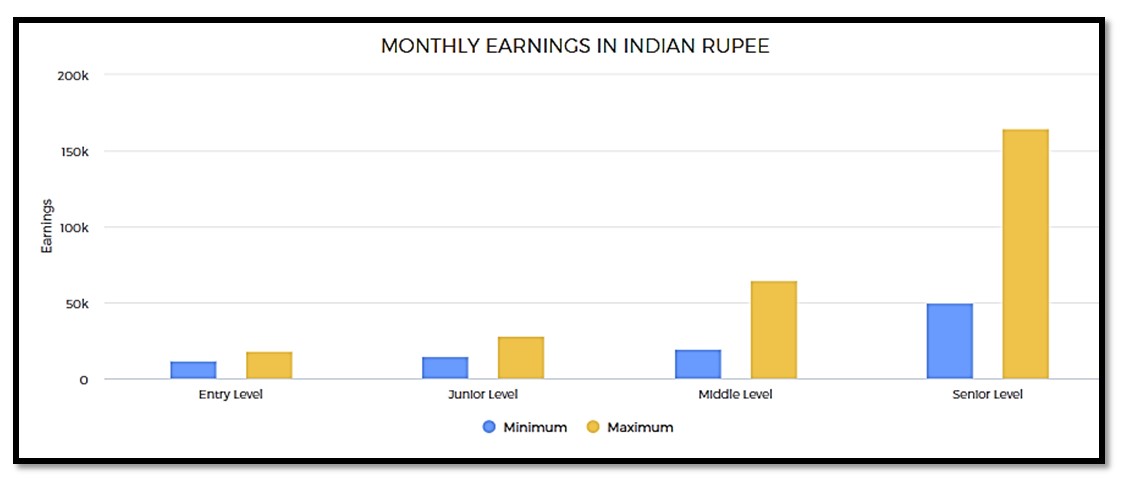
Monthly Earnings In Indian Rupee
Entry Level | Junior Level | Mid Level | Senior Level | ||||
Min Earning | Max Earning | Min Earning | Max Earning | Min Earning | Max Earning | Min Earning | Max Earning |
12000 | 18000 | 15000 | 28000 | 20000 | 65000 | 50000 | 165000 |
1. Entry level: 0 - 2 years of work experience
2. Junior Level: From 1 to 12 years of work experience
3. Mid Level: From 5 to 20+ years of work experience
4. Senior Level: From 10 to 25+ years of work experience (there could be exceptions in some high-end technical, financial, engineering, creative, management, sports, and other careers; also in the near future, people will reach these levels much faster in many careers and in some careers, these levels will have no meaning as those careers will be completely tech skill driven such as even now, there is almost no level in a Cyber Security Expert’s job)
Work Activities
1. Addressing grievances and resolving conflicts: Handling complaints and grievances to resolve; resolving conflicts among co-workers or others at the workplace or outside of your work.
2. Assisting and caring for people: Assisting people in availing of services; taking care of people in different situations; offering help and services to others.
3. Providing advice and consultation to others: Giving advice or consultation to others about various issues, conceptual matters, know-how, scientific matters, products, or services.
4. Analyzing and interpreting data and information: Analysis of data and information to find facts, trends, reasons behind situations, etc.; interpretation of data to aid in decision-making.
5. Communicating with co-workers and others: Communicating with people in writing, verbally or otherwise inside your workplace and various other people who have professional relationships with your place of work including vendors, government officials, etc., or with people at large
6. Decision-making and problem-solving: Analysis of data and information; evaluation of alternative decisions and results of decisions; making the right decisions and solving problems.
7. Developing and maintaining interpersonal relationships: Developing professional relationships with co-workers and others outside organizations and maintaining good relationships.
8. Getting Information and learning: Observing, hearing, reading, using computers, or otherwise obtaining information and learning from it.
9. Handling administrative activities: Handling various administrative tasks and managing day-to-day operations.
10. Inspecting equipment, systems, structures, and materials: Inspecting equipment, systems, structures, and materials to ascertain quality, performance, defects, causes of errors, etc.
11. Inspecting situations, events, and people: Inspecting situations, events, and people to understand the reasons and causes for the situation or events to happen; inspecting people to understand reasons behind their behavior and actions.
12. Managing and supervising: Managing and supervising the work of others; setting goals; giving instructions; monitoring work performance, etc.
13. Updating and using relevant knowledge: Keeping updated with the latest knowledge relevant to your fields of work and use of the relevant knowledge in getting things done.
14. Using computers for work: Using computers for day-to-day office work; using computer software for various applications in day-to-day professional work; entering data and processing information; for writing.
15. Working in a team: Working in a team of people; developing a team; and maintaining professional relationships among team members.
Future Prospects
As the number of emergencies such as accidents and natural disasters is increasing rapidly, Emergency Medicine and Trauma Care have become the need of the hour. According to the India Brand Equity Foundation (IBEF), the Indian healthcare industry is estimated to rise at a Compound Annual Growth Rate of 16-17 % to record Rs. 8.6 Trillion by the year 2025. This means that there is a significant scope for improving healthcare services as healthcare spending as a percentage of GDP Gross Domestic Product is on the rise. The government of India is planning on increasing investment in public health spending to a percentage of 2.5% of the total GDP by the year 2025.
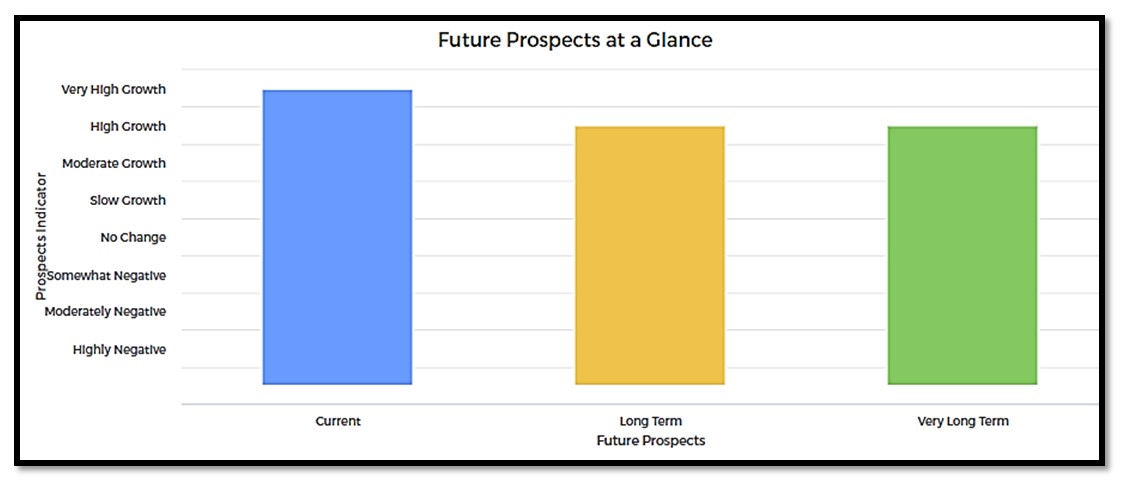
Future Prospects At A Glance
Current (0-1 year) | Long Term (2-5 years) | Very Long Term (6-10 years) |
Very High Growth | High Growth | High Growth |


